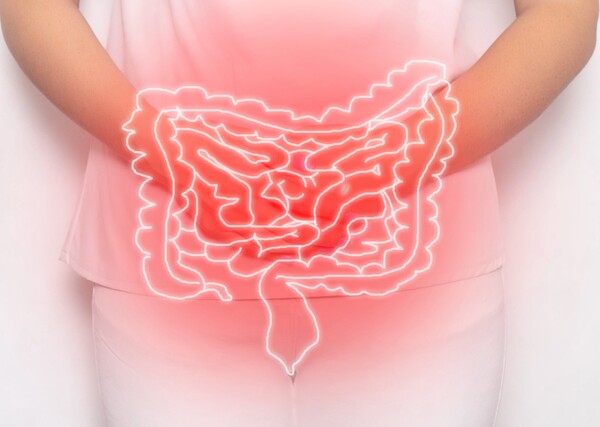Abdominal inflation, a feeling of gas in the intestines that causes the stomach to swell like a balloon, is a common symptom of many digestive diseases. It can be a symptom of stomach or colon cancer, and certain foods with lactose intolerance or carbohydrate intolerance can also cause it.
"The first thing we can think of is that it is caused by the proliferation of various harmful bacteria in the small intestine," said Dr. Hong Seung-wook, a professor of gastroenterology at Asan Medical Center in Seoul, on the YouTube channel “Asan Medical Center.”
When food enters the system, the bacteria in the small intestine digest it, producing various gases. If the bacteria in the small intestine proliferate, massive intestinal gas is produced, causing the small intestine to expand and triggering symptoms, Professor Hong explained.
Another common cause of bloating is lactose intolerance or carbohydrate intolerance.
"We've all heard or seen people complain of stomach pain, discomfort, or diarrhea after drinking milk. If you're intolerant to certain foods, the osmotic pressure in the small intestine can increase, causing excess fluid to be retained there, leading to symptoms like bloating," Hong said.

Another common cause of bloating is intestinal sensitivity.
"It's a common cause of irritable bowel syndrome," Professor Hong said. "It can be traced back to the neurological connection between the brain and the gut, so it can be more pronounced if the patient is anxious, depressed, or has somatization symptoms."
Besides, problems with intestinal motility itself can also cause symptoms of bloating. “For example, patients with gastroparesis or constipation-type irritable bowel syndrome who have slow bowel movements," Hong explained, adding that this type of bloating can be common.
Another, albeit less common, cause of abdominal distension is a mismatch between abdominal and diaphragmatic movements. Abnormal dysregulation of abdominal wall movement can also lead to bloating.
"In some cases, the abdominal and diaphragmatic movements are not coordinated," Dr. Hong said. "When there is a lot of gas in the gastrointestinal tract, the abdominal wall normally moves inward, and the diaphragm moves upward to prevent the abdomen from expanding due to the gas-filled GI tract, but this whole sequence of reactions can be dysregulated, causing the diaphragm to move downward and the abdominal wall to relax, causing the abdomen to expand, contrary to what we expect."
Abdominal bloating, if accompanied by anemia, gastrointestinal bleeding, and weight loss, should be suspected as a sign of gastrointestinal cancer, such as stomach or colon cancer, and be checked through tests.
There are many ways to differentiate the causes of abdominal bloating, but the first step is the same. Through a medical history and physical examination, it's possible to assess which of several causes may be primarily responsible for the bloating.
"In particular, a detailed examination of the patient's diet, bowel habits, bowel motility, and previous surgical history is necessary, as well as a detailed examination of the patient's current medications and dietary supplements," Professor Hong said.
If the patient has constipation and abdominal distension, the first step is to perform an intrarectal pressure test and a test to evaluate the motor function of the large intestine.
"If there is a suspicion of bacterial overgrowth in the small intestine in patients with abdominal distension, or if abdominal distension worsens when eating certain foods, a hydrogen exhalation test can be performed at the hospital," Hong said. "The hydrogen exhalation test is a safe and non-invasive test that measures the gas produced in the colon from unabsorbed carbohydrates as it diffuses through the body's circulation and is excreted through breathing."
Treating abdominal inflation is not easy. There's no single, foolproof treatment. For starters, it is recommended to eat a diet low in FODMAPs (Fermentable Oligosaccharides, Disaccharides, Monosaccharides, And Polyols), which are a group of carbohydrates that are poorly absorbed in the small intestine and can exacerbate irritable bowel syndrome (IBS), including oligosaccharides, disaccharides, monosaccharides, and polyols.
"Medications, such as probiotics, antibiotics that work in the intestines, prokinetic agents that promote bowel movement, and neuromodulators may be prescribed in cases of intestinal sensitivity, and treatments, such as biofeedback, may be considered for patients with constipation," Hong said.
In conclusion, Dr. Hong said, "Abdominal bloating can significantly impact quality of life, so a comprehensive approach is needed. If you feel uncomfortable in your stomach and have a feeling of being full, we recommend that you visit your local hospital and consult with a specialist to evaluate and treat your symptoms."

